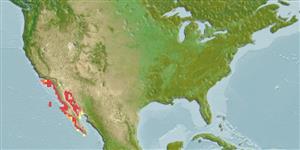Environment: milieu / climate zone / depth range / distribution range
Ecology
Marine; demersal; depth range ? - 46 m (Ref. 2850), usually 3 - 15 m (Ref. 2850). Subtropical; 34°N - 20°N, 121°W - 109°W
Eastern Pacific: California, USA to Baja California, Mexico.
Length at first maturity / Size / Weight / Age
Maturity: Lm ?, range 27 - ? cm
Max length : 45.0 cm TL male/unsexed; (Ref. 9118); common length : 30.0 cm TL male/unsexed; (Ref. 9118); max. published weight: 700.00 g (Ref. 2850); max. reported age: 20 years (Ref. 72462)
Common species found near the bottom, often in caves and crevices of exposed coasts and open bays (Ref. 9118). Feeds on crabs (Ref. 9118).
Eschmeyer, W.N., E.S. Herald and H. Hammann, 1983. A field guide to Pacific coast fishes of North America. Boston (MA, USA): Houghton Mifflin Company. xii+336 p. (Ref. 2850)
IUCN Red List Status (Ref. 130435)
Threat to humans
Harmless
Human uses
Tools
Special reports
Download XML
Internet sources
Estimates based on models
Preferred temperature (Ref.
123201): 16.7 - 24.2, mean 22.3 °C (based on 110 cells).
Phylogenetic diversity index (Ref.
82804): PD
50 = 0.7500 [Uniqueness, from 0.5 = low to 2.0 = high].
Bayesian length-weight: a=0.00933 (0.00538 - 0.01619), b=3.09 (2.94 - 3.24), in cm total length, based on LWR estimates for this species & (Sub)family-body (Ref.
93245).
Trophic level (Ref.
69278): 3.6 ±0.60 se; based on food items.
Generation time: 6.0 ( na - na) years. Estimated as median ln(3)/K based on 1
growth studies.
Resilience (Ref.
120179): Medium, minimum population doubling time 1.4 - 4.4 years (K=0.18).
Fishing Vulnerability (Ref.
59153): Moderate to high vulnerability (49 of 100).
